- News
- Reviews
- Bikes
- Accessories
- Accessories - misc
- Computer mounts
- Bags
- Bar ends
- Bike bags & cases
- Bottle cages
- Bottles
- Cameras
- Car racks
- Child seats
- Computers
- Glasses
- GPS units
- Helmets
- Lights - front
- Lights - rear
- Lights - sets
- Locks
- Mirrors
- Mudguards
- Racks
- Pumps & CO2 inflators
- Puncture kits
- Reflectives
- Smart watches
- Stands and racks
- Trailers
- Clothing
- Components
- Bar tape & grips
- Bottom brackets
- Brake & gear cables
- Brake & STI levers
- Brake pads & spares
- Brakes
- Cassettes & freewheels
- Chains
- Chainsets & chainrings
- Derailleurs - front
- Derailleurs - rear
- Forks
- Gear levers & shifters
- Groupsets
- Handlebars & extensions
- Headsets
- Hubs
- Inner tubes
- Pedals
- Quick releases & skewers
- Saddles
- Seatposts
- Stems
- Wheels
- Tyres
- Health, fitness and nutrition
- Tools and workshop
- Miscellaneous
- Tubeless valves
- Buyers Guides
- Features
- Forum
- Recommends
- Podcast
feature
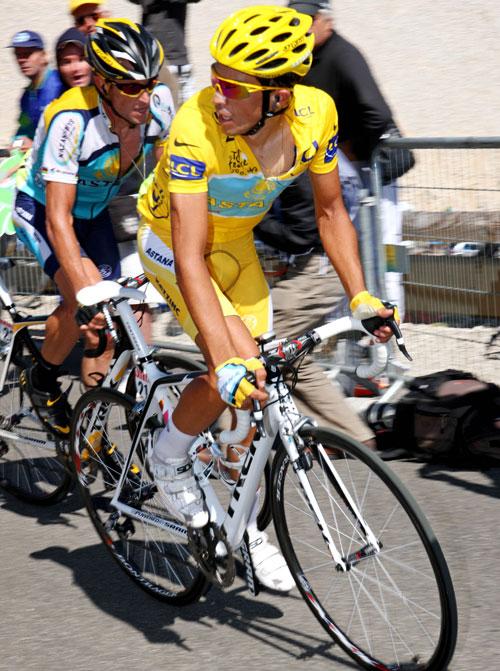 Contador and Armstrong on Mont Ventoux (Photosport International)
Contador and Armstrong on Mont Ventoux (Photosport International)Tour de France 2009 review
So for another year the carnival (or circus, or freak show, depending on your point of view) is over. After the crowds disperse on the Champs Elysées, all that's left on the roads of France are memories, fading chalk messages and discarded energy gel wrappers as the Tour packs up for another year. And it's certainly been an interesting Tour de France. A classic? no. But interesting.
The subplots and schemes of the 2009 tour may well have captured the headlines, but in the end the top of the GC was all about one man. Say what you like about his guarded interviewing manner and calculating approach to racing but there was no-one to touch Contador this year.

There's been plenty of lamenting the fact that the time bonuses for stage wins are history. Many pundits have suggested that with the extra carrot of an extra 20 seconds to ride for at the line, the GC race would have been more interesting. I just think it would have made Contador even more dominant. The Spaniard won when he had to: on the summits and in the individual TT. Had he needed to win more, he would have won more. Andy Schleck, for all his gung-ho attacking, wasn't able to get a wheel width on Contador at any point; Contador, when he needed to, simply rode away from everyone. Winning the individual TT as well just underlined his massive advantage. He was imperious: remind you of anyone? Come next year, unless something happens, he should win again.
The Schleck brothers gave it everything they had, and they make the spearhead for a formidable team. Andy is the star right now, no doubt. At 24 his best years are very much ahead of him and he's shown that he's the closest rival to Contador in the mountains right now. In his brother Frank he has a formidable lieutenant, a strong all-round GC contender in his own right. The understanding and work ethic that the two share will stand them in good stead for the years to come, whether they decide to stay together or split to lead separate teams. Andy leaves with the white jersey for best young rider; it's surely only a matter of time before he swaps white for yellow.
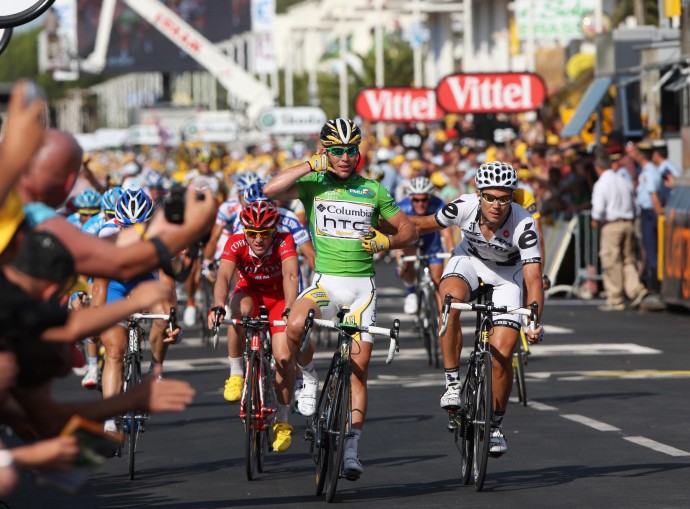
Mark Cavendish has confirmed his position as the world's top sprinter, and his Columbia HTC team have been exceptional in their support. We've known for some time that the Manxman is fastest in a straight line but this Tour has seen him win not just the straight, flat sprints but also uphill finishes and tight, twisting run ins: with the exception of Barcelona, everything that came down to a bunch sprint was his, and he's now the Briton with the most stage wins, his 10 eclipsing Barry Hoban's eight – and he's still only 24. We've also seen him learn a lot as a rider, and as person, in the last three weeks.
After Cav's outburst at Hushovd, born of frustration, over the decision of the judges to strip his green jersey points for the Colmar-Besançon stage, Hushovd's response was that of a man well worthy of green. He attacked on a stage that wasn't at all the type to favour him, beat the climbers to the top of a category 1 col and raced down the other side to gather the intermediate points and effectively put himself out of Cavendish's reach. It took that, I think, for Cavendish to fully realise that the green jersey is about more than just being first over the line.
His own response was to dig deep and work hard on the stage from Bourgoin-Jallieu to Aubenas, stay in contention on the late climb and work with a much diminished team in the sprint, leading it out from too far back but showing the mettle and strength to grasp the win. It's without doubt the most impressive of his career: on a stage that didn't suit him, with a finish that didn't suit him, without his big guns to lead him out.
The words exchanged between Hushovd and Cavendish behind the podium as they queued for their respective prizes that day were reconciliatory; Hushovd has earned his prize but Cav's the man for the line. Next year we'll see a cannier Cavendish, I'm sure. For the moment they're friends again. On the final hairpin of the Ventoux the two sprung from the autobus, laughing as they played out a dead-heat sprint for 104th place on the stage.
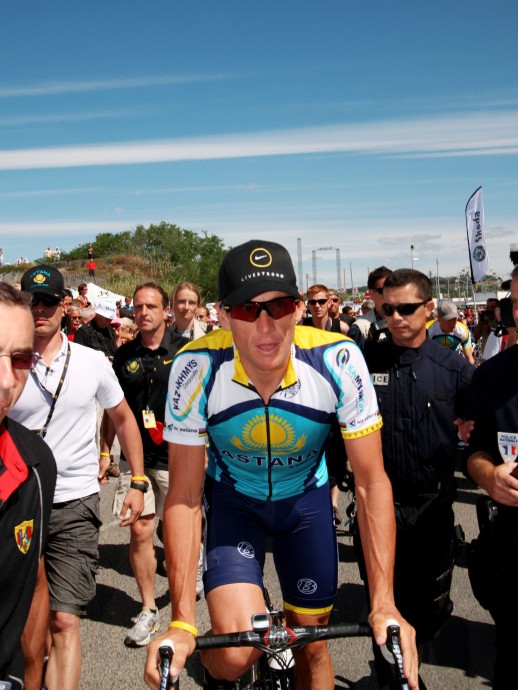
And Armstrong? Well, where in the past a minor place on the podium would have been a massive disappointment to the Texan, this year the a mellow Armstrong has been pragmatic about his chances. Looking back to the first week and the stories of in-fighting and factions in the Astana camp it all seems a little like hyperbole now: Bruyneel clearly knew, and Armstrong clearly knew, that no-one would be able to touch Alberto. Such a strong team was Astana that they occupied four of the top five places for much of the first week; even after three weeks' hard racing there were still three Astana men in the top ten, two of those on the podium.
Armstrong wasn't really needed as a support rider for Contador – there were plenty of them – and was pretty much free to concentrate on his own race. Given the three-year lay-off and his far-from-ideal preparation for the 2009 race, third place is a remarkable achievement for the 37-year-old and I think he knows it. Talk of 2010 and another win is probably fanciful: even Armstrong at his peak would have struggled to stay with Contador, and another year in the legs is only really likely to keep the Texan treading water. He showed his mettle in the high mountains and against the clock, but he also showed that he's beatable.
Armstrong's third place this year was very much built on a minute understanding of the intricacies of road racing: except where his legs failed him he was never, ever in the wrong place. But if such a consumate, professional performance is only enough to garner third place, we have to assume that the Armstrong era ended with the last win. The Tour will welcome him back with Radio Shack in 2010, I'm sure. Assuming that Contador and the Schleck brothers also return, I can't see how he'd win.
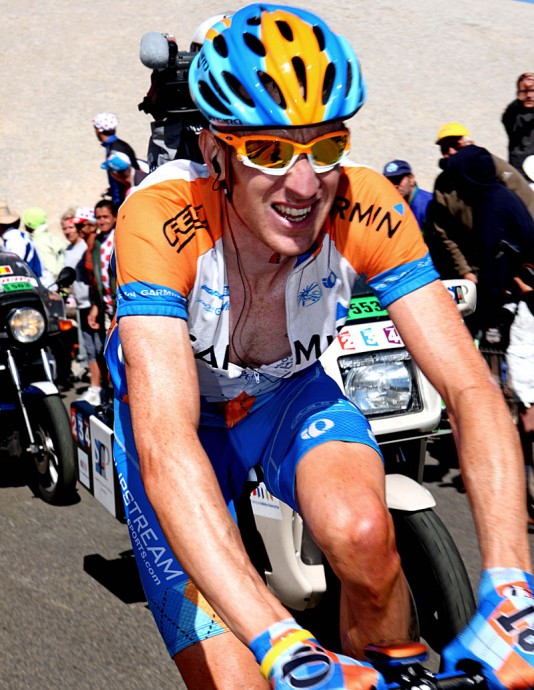
And then there's the dark horse. Bradley Wiggins, a revelation. In some ways this will be the easiest year for him: there was no expectation, and even at the foot of the Ventoux the prayers for his ascent were delivered more in hope than anticipation. But Wiggins' final Tour climb was a gritty, heroic, underdog performance and the fourth place overall – the best British finish, matching that of Robert Millar in 1984 – is nothing more than he deserves. What's most refreshing is that this new, determined, road racing Bradley Wiggins is still quite obviously the same joker in the pack that garnered three Olympic gold medals and plenty of friends.
There's been hard work and dedication to lose the weight and get competitive in the mountains, but it's backed up with the same irreverence and joie de vivre we've come to expect from the big man. The halls of Twitter are full of his wry and honest observations on the other side of the tour, and he spent the ascent of the Tourmalet shouting, "That's what I'm talking about!" at the top of his voice. “I was just messing around trying to chill everyone out.", he says. "Levi [Leipheimer] was going nuts at me: ‘What the hell’s the matter with you? Are you crazy?'. I know a lot’s at stake but I could have a lot of fun on the way”.
Crazy, maybe. But beneath the jokey persona is a rider who has unshakeable belief in his ability to compete at the highest level, and he's a proven champion with unmistakeable pedigree: is it any real surprise that he can turn his hand to stage racing if he decides to? He has access to one of the best coaching setups in the world in British Cycling, and even though it might mean that they lose one of their track stars to another discipline they have helped Wiggo lose the weight and tune his body from a four-minute effort to the long haul of a three week race. 'Twiggo' is the new moniker, and here's hoping that another year of preparation, and another year of experience – the 40 seconds he lost to Armstrong in the peloton split on stage 3 effectively cost him third place – will have him gracing the podium in 2010. Next year, of course, he'll have the weight of expectation of a whole country on his shoulders...
As is sadly always the case these days we'll have to wait until maybe Christmas before we can ink in the top ten. Mercifully there have been no positive tests of the Tour riders during the race, but Di Luca's suspension for CERA doping during the Giro has reminded us all that scandal is never far from the door of pro cycling. Even as Contador is processing up the Champs Elysées, there are plenty of voices questioning his achievements. Greg Lemond, by dint of his being a heavyweight in the sport and his well-publicised anti-doping stance, is probably the biggest name to cast doubt.
Contador's ascent to Verbier, covering 8.5km at 7.5% average gradient in under 21 minutes is by most metrics the fastest ascent ever by a professional road cyclist. Lemond's view – backed by Antoine Vayer, a performance expert who used to work with the now-disgraced Festina team – is that Contador should be asked to prove that he is capable of producing such a feat without any performance enhancers. An athlete's maximal oxygen intake (VO2 max) is what limits their aerobic performance: Contador's effort, Lemond claims, would require a VO2 max superior to any living athlete, a claim later countered by some independent physiologists although everyone seems to agree his numbers would have to be quite high. When Contador was asked about Lemond's article, and about his VO2 max at the press conference following the Annecy TT, he chose not to reply.
Contador's stance is common among the pros: when asked to deny that he's ever taken performance enhancing products he points to the fact that he's never tested positive, and is always available for testing. It's an understandable position but in these days where any performance out of the ordinary is viewed with suspicion – and rightly so given what we know from previous years – pro cyclists need to go further. Hats off again, then, to Bradley Wiggins, who has instructed the UCI to publish his blood values from their much-discussed blood passport scheme. The data will be available along with all the numbers from Garmin Slipstream's internal testing. He has, he says, nothing to hide. "Everybody at Manchester had always said I've got the numbers to do well on the road", he says, and his focus and incredible effort on the slopes of the 2009 race have backed those numbers up with a result.
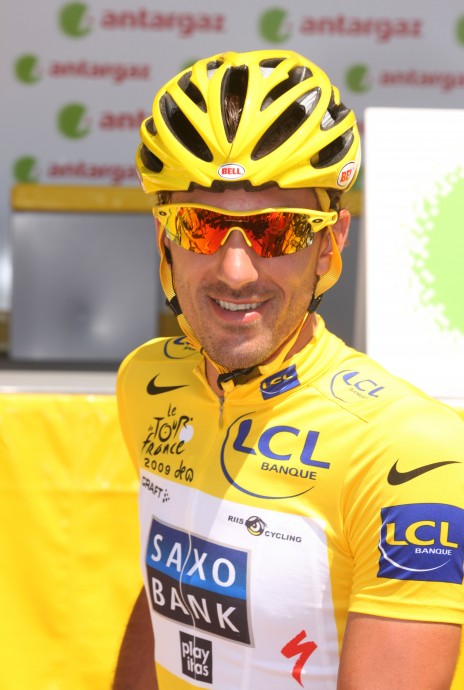
There are plenty of other riders worthy of note. Pellizotti's audacious, intelligent riding to secure the polka dot jersey has been a great spectacle. Cancellara's prologue win and determination to hang on to yellow as long as possible (including the nailbiting team time trial and *that* descent) was a fine first-week subplot, and the Swiss cemented his performance with a solid individual TT in Annecy and plenty of work for the team in the mountains. Tony Martin had a bad few days but came back on the Ventoux in style and will be one to watch in coming years. We'll remember David Millar fondly this year too, for his near miss in Barcelona and his tireless work for his team. But for all these, and the jersey winners, and Cavendish's hatful of stage wins, it's Wiggo whose race has captured the imagination, and it's his story that will live longest in the memory here at road.cc
This is an expression of the problem right there. And we'd be embracing a hopeless arms race if more people get the idea. Doubly so if more...
"I never paid attention to my financial affairs...". It may sound harsh as I'm sure he was royally taken advantage of but most people don't have...
Resorting to fines just sends the message that it's okay to be run over by rich people.
Rather artistic photo of this (driverless) car that has ended up on its roof on a dead straight road in Bradford....
If the trees are now a smokescreen, it doesn't sound like there's much to save any more.
Cool - that removes one of my issues with Garmin. I'm quite happy with the Wahoo Elemnt Bolt, so I doubt that I'll be switching unless Garmin come...
No doubt it will catch on in Plymouth, but it is Devon, where everything happens 10 years later. Not least the buses....
GCN just did a cool video on this. All I could think by the end was that perhaps if you got to do what the presenter did and mince around Italy in...
I missed that, thanks for pointing it out. I can't comment, as that's outside my area of expertise. Apologies to Rendel. This is why they should be...